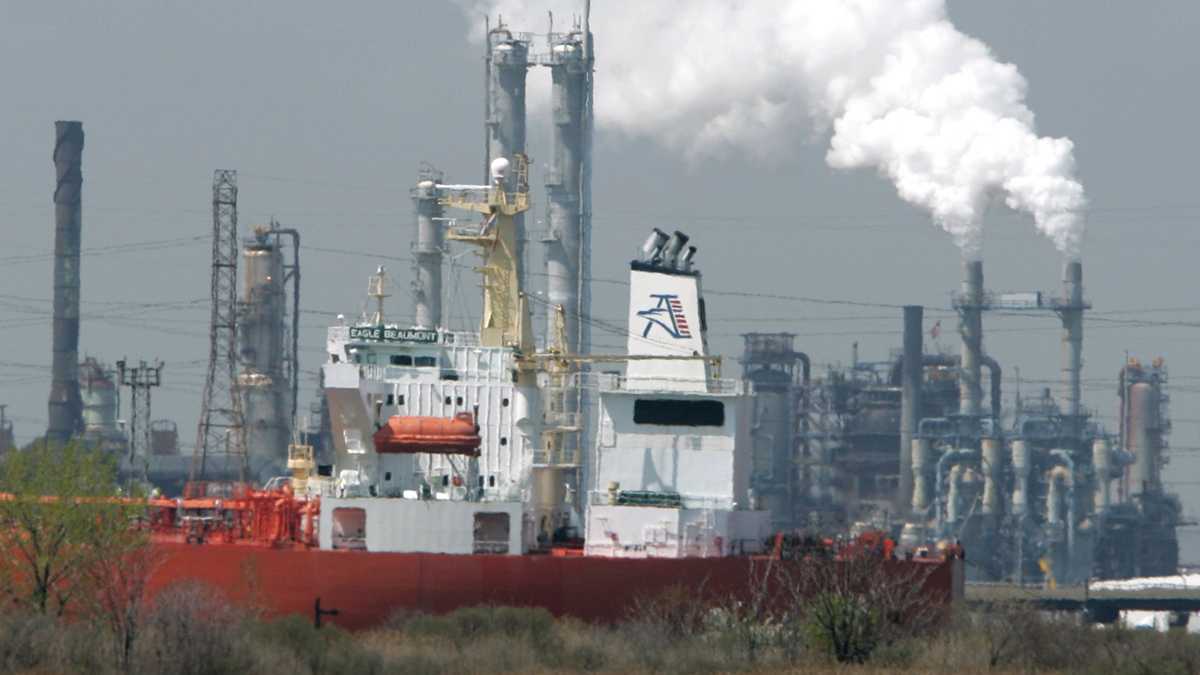Critics blast Christie administration over the Exxon settlement at legislative hearing

2008 file photo of an oil tanker is docked in Linden, N.J., with the Bayway refinery in background. (AP Photo/Mike Derer, file)
The State of New Jersey has abrogated its responsibilities to pursue natural-resources damages against polluters who have damaged its groundwater, wetlands, and marshes, according to NJ Assemblyman John McKeon (D-Essex).
McKeon, the chairman of the Assembly Judiciary Committee, made his remarks at the conclusion of the panel’s second hearing on a draft settlement that would have Exxon Mobil pay $225 million to settle natural-resources damage claims resulting from operations at three refineries it once owned, 16 other sites, and about 1,760 retail gas stations.
The proposed settlement, which still must be approved by a judge, would end a decade-old lawsuit brought by the state against the company, a case in which the state originally sought $8.9 billion in damages caused by pollution to wetlands, marshes, and other areas at its refineries in Linden and Bayonne.
The proposal to settle the case for far less has provoked a huge outcry from both environmentalists and lawmakers, who say it is nowhere near enough to restore the areas damaged by pollution.
Critics of the draft settlement also argue it is flawed because it lets Exxon Mobil off the hook for future natural-resources damages from other sites not part of the long litigation. That includes hundreds of retail stations owned by the company that may have polluted groundwater, along with 16 other facilities.
Exxon Mobil is still under obligation to clean up those sites from any pollution, but not to restore natural resources damaged by the contamination.
McKeon noted that the proposed settlement, however, could be whittled down by money allocated to an outside law firm hired by the state to conduct the litigation and funds diverted to balance the state budget.
The Christie administration, which has declined to appear at the hearing and the previous session, has defended the draft settlement saying it is on top of the money Exxon Mobil will pay for to clean up the sites, a process that will go on for decades. Exxon Mobil also has declined to appear at the hearings.
At the Linden refinery, now owned by another company, the major source of pollution is Morses Creek, a tributary of the Arthur Kill, where both cooling water and wastewater from the plant were discharged, according to Neil Yoskin, an attorney who spoke before the committee.
The problems relating to those discharges will not be addressed for a long time, because the proposed settlement stipulates the company does not have to deal with the pollution until the refinery shuts down, Yoskin noted.
McKeon also questioned why the Christie administration has filed only one natural-resources damage suit since it took office. From 2004 to 2009, 151 such suits were filed by the state he said.
“If there is a lack of belief in the natural-resources damages, it’s a sea change in what the law is,’’ McKeon said.
Jeff Tittel, director of the New Jersey Sierra Club, argued the only way lawmakers are going to understand how the settlement was reached is by granting the committee subpoena power to call both the attorney general and Department of Environmental Protection to discuss why it settled the case — before a judge issues a decision. The courts already have found Exxon Mobil liable for pollution in the case.
McKeon plans a public hearing in Linden on the proposed settlement, which has been criticized by local officials.
________________________________________________________
NJ Spotlight, an independent online news service on issues critical to New Jersey, makes its in-depth reporting available to NewsWorks.
WHYY is your source for fact-based, in-depth journalism and information. As a nonprofit organization, we rely on financial support from readers like you. Please give today.




